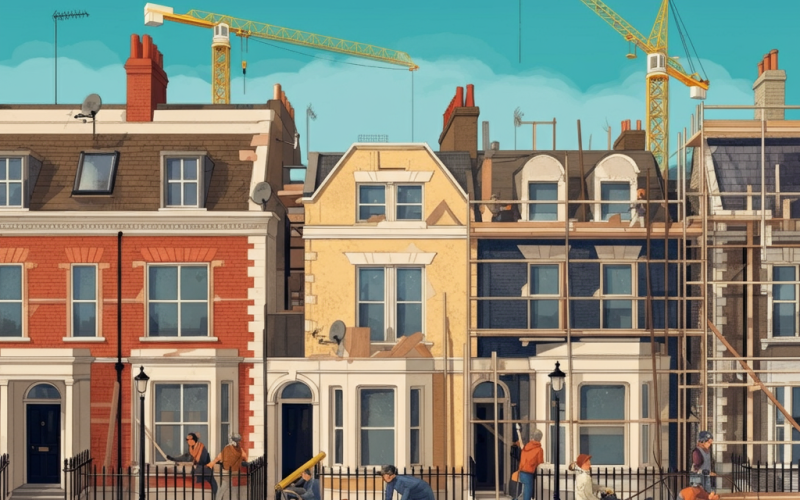Renovating your home is an exciting way to breathe new life into your living space, increase property value, and create a place perfectly tailored to your needs. For London homeowners, the growing popularity of home renovation projects is undeniable, with an increasing number of property owners choosing to upgrade rather than move.
But how much should you expect to spend on home renovations in London in 2025? And how can you manage costs effectively? Whether you’re a homeowner looking to modernise your kitchen, a property investor upping rental appeal, or a renovation enthusiast pursuing your next big project, this guide will cover renovation costs, trends, and everything in between to help you budget smartly and stay ahead of market changes.
London’s Current Property Market and Renovation Trends
London’s housing market has long been renowned for its competitiveness, high demand, and unique architectural charm. The allure of London living continues to attract buyers and property developers alike, but rising property prices make relocating a challenge for many homeowners. As a result, home renovation in London has become an appealing alternative, allowing residents to improve their homes without the hassle of moving.
Additionally, the growing focus on sustainability and energy efficiency has led to trends in eco-friendly renovations. From installing solar panels to upgrading insulation and windows, environmentally conscious improvements are becoming a priority for many property owners.
The city also boasts a rich tapestry of architectural styles, from Victorian terraces to modern flats. Each property type offers renovation opportunities and challenges. For example, period homes often require specialised restoration work, while contemporary apartments may need higher-end finishes to maximise their value.
What Influences Home Renovation Costs in London?
Renovation projects in London come with unique pricing dynamics. Factors affecting your home renovation costs include the following:
1. Materials
The cost of materials can vary significantly depending on your choice of finishes and fixtures. For example, wooden flooring typically ranges from £20-£100 per square meter, depending on whether you opt for engineered wood or reclaimed oak. Keep in mind that material prices can also fluctuate based on supply chain issues and import tariffs, so budgeting a little extra is always wise.
2. Labour
London labour rates are among the highest in the UK due to skilled shortages and the region’s increased demand for trades such as plastering, electrical work, and plumbing. Expect labour costs to range between £200-£400 per day, depending on the trade and expertise required.
3. Permits and Regulations
Major renovations often require building regulations approval or planning permission, depending on the level of structural change. For example, extensions usually need planning approval, which comes with fees between £200-£500, and potentially more if you require an architect or planning consultant to help with the application.
4. Property Type
Renovating period properties often involves additional costs due to heritage requirements or complexities such as uneven flooring or outdated electrical systems. Conversely, flats in London might incur extra fees, such as contributions to management or service charges for communal works.
5. Size of Renovation
Unsurprisingly, large-scale renovations cost more than smaller projects. Whether you’re redesigning a single room or adding an entire second store, the scale of the project will dramatically influence your budget.
Estimated Costs for Different Home Renovations in London
Breaking down costs by project type can give you a clearer idea of what to expect when planning home renovations in London UK. Here’s an overview of typical renovation types and their associated costs.
1. Kitchen Renovation
A fresh, functional kitchen can completely transform your home.
- Basic remodel (e.g., replacing worktops and cabinets): £8,000–£15,000
- Mid-range remodel (e.g., new appliances and layout changes): £15,000–£35,000
- Luxury renovation (e.g., bespoke cabinetry and high-end materials): £40,000+
2. Bathroom Renovation
Bathrooms are a top priority for many homeowners looking to refresh a tired space.
- Basic remodel (e.g., repainting, simple fixtures): £5,000–£10,000
- Mid-range remodel (e.g., new tiling, walk-in showers): £10,000–£20,000
- Luxury renovation (e.g., freestanding tubs and custom finishes): £25,000+
3. Extensions
Creating additional living space is particularly popular in London, where square footage is precious.
- Single-store extensions (20m²): £50,000–£75,000
- Double-store extensions (40m²): £85,000–£120,000
- Loft conversions (with en-suite): £40,000–£65,000
4. Whole-Home Renovation
For extensive redesigns involving multiple rooms or full structural alterations, budget a minimum of £100,000+ depending on the property’s size and scope.
Tips to Save Money on Renovation Projects
Renovation projects can be costly, but the good news is that there are plenty of ways to save money without compromising quality or style.
- Plan Ahead
Careful planning ensures you stay on budget and avoid costly surprises. Work with professional architects or project managers to map out every detail and timeline.
- opt for Quality Over Quantity
Not everything in your home needs to be high-end. Focus on quality for major items (e.g., flooring and worktops) and consider cost-saving alternatives for less critical elements like lighting fixtures.
- DIY Small Tasks
While significant work such as plumbing and wiring should always be left to professionals, smaller tasks like painting or assembling furniture can save you hundreds, if not thousands, of pounds.
- Reuse and Recycle
Consider using salvaged or reclaimed materials for unique, sustainable, and cost-effective finishes.
- Request Multiple Quotes
Get quotes from at least three contractors to ensure you’re getting fair market rates. Also, don’t hesitate to negotiate!
- Timing is Key
Off-peak seasons, such as autumn and winter, often come with more competitive quotes from contractors.
Real-Life Case Studies of London Renovations
Case Study 1
Project: Kitchen Addition with Eco-Friendly Upgrades
Location: Islington
Cost: £25,000
Result: A modern kitchen with energy-efficient appliances and underfloor heating.
Case Study 2
Project: Loft Conversion with Dormer Windows
Location: Clapham
Cost: £60,000
Result: A spacious new bedroom with an en-suite bathroom was added, which increased the property value by 15%.
What Will Home Renovation Costs Look Like in 2025?
Experts predict that home renovation costs in London will continue to experience moderate increases due to inflation, rising material costs, and labor shortages. However, technological advancements in building materials and prefab construction may help offset these hikes.
Sustainability will also continue to be a driving force. Green renovations, like installing solar panels and energy-efficient HVAC systems, are expected to become even more popular, with homeowners prioritizing eco-conscious living.
Take the Next Step for Your Home
Whether you’re planning a minor bathroom upgrade or a full-scale extension, home renovation in London, UK, can be a rewarding project when handled thoughtfully. With careful planning, expert support, and a clear budget, you can transform your space into something both functional and beautiful.
If you’re ready to move forward, connect with local experts, compare quotes, and start designing your dream home renovation today.












